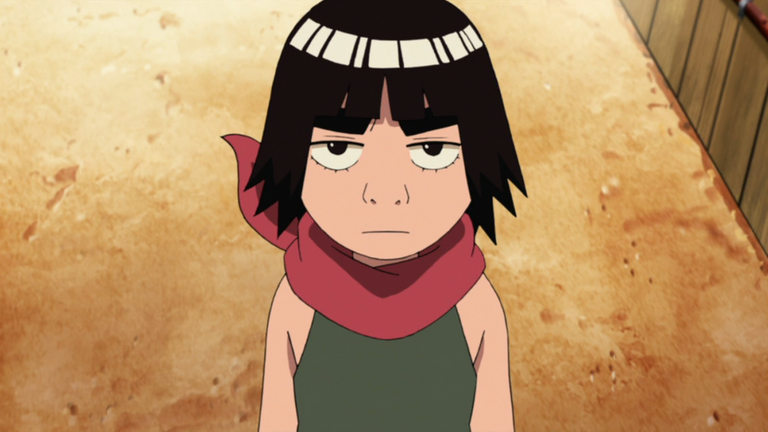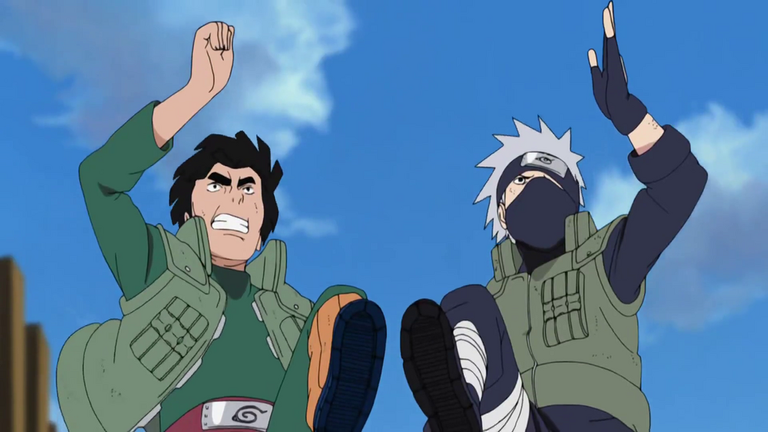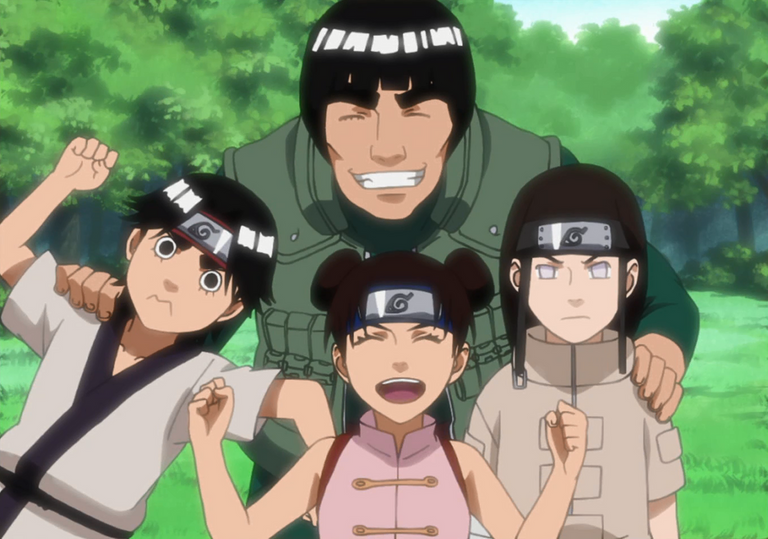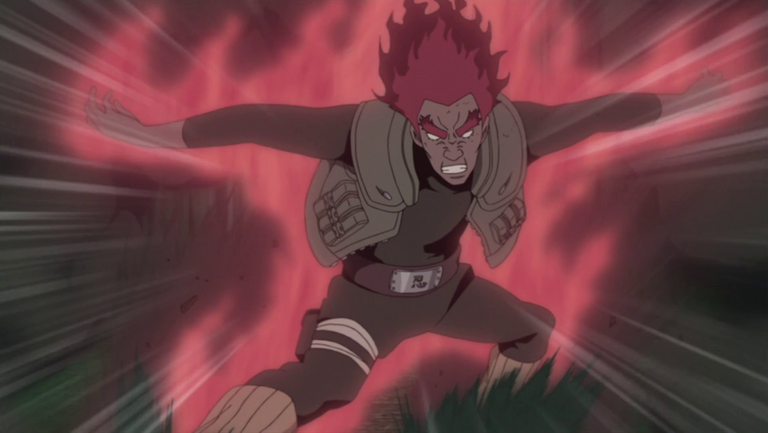
[ENG]
« It matters not how strait the gate,
How charged with punishments the scroll,
I am the master of my fate,
I am the captain of my soul.»
(William E. Henley)
The year was 1888. William E. Henley, oppressed by a physical illness that forced him to live a painful life, decided to write a poem to recount his condition and he did so by shouting, through paper, as loudly as he could. Every year lived in the shadow of that illness was within reach, imprinted in those lines in which heartbreak and hope merge, becoming a hymn to the invincibility of the human soul.
The themes of struggle, illness and 'defect' (understood as deprivation of something vital and indispensable to man) have been part of the 'topoi' of world literature since its beginnings and, with a broader view, they can also be traced in anime. With an eye on Naruto, these themes become evident when it comes to Maito Gai (Might Guy), a man who has dedicated his very existence to fighting against his own physical and mental limitations.

From an early age, Gai was faced with the need to make up for an enormous flaw: his own lack of aptitude for the main ninja arts forced him to practise the one and only taijutsu.
The son of Dai Maito, he will be baptised into the martial arts by him. Due to his lack of aptitude for magic and illusionary jutsu, he will always be a step behind his talented comrades with an easier and safer future in the ninja world.
Gai has always relied only on his own strength and discipline, going so far as to overcome inviolable limits that have made him a hero.
This state of being will often lead him to be the target of ridicule and mockery, a fate he will at least initially share with his father, who is also limited in the use of the ninja arts and for this reason also remained a genin throughout his life. Despite this, thanks mainly to the latter's moral teachings, Gai will manage to increase his willpower and commitment to training, becoming in time one of the most skilled ninjas in the martial arts.
Gai Maito between Philosophy and 'Romanticism
Fundamental to the character's growth will be the concept of 'self-regulation'. For the ninja, self-regulation is an unwritten pact with himself from which he cannot break. A dogma that will allow the young man to increase his constancy in training, preventing him from giving in even when his body is on the verge of collapse. Thanks to this notion, always imparted to him by his father, Gai makes himself superior to the physical laws and limitations that normally restrain other shinobi.
The very concept of 'limit' can be taken as a symbol to trace the characterisation of Gai's character. From a literary point of view, he can be seen as a romantic hero in constant search of the absolute and the limitless.
Contrary to the typical 'romantic', however, the absolute for the ninja coincides with the attainment of perfection in his art and, precisely for this reason, it takes on two different natures: the first, immanent, coincides with the concept of self-regulation that already pushes him towards the fulfilment of his ideal of perfection through training; the second, abstract, can be explained through the analysis of the concept of 'youth', a further cornerstone of the master's philosophy.

Gai has always relied only on his own strength and discipline, going so far as to overcome inviolable limits that have made him a hero.
If self-regulation is what allows Gai to overcome his physical limitations, youth operates a different process, but represents an evolution.
Faced with the incessant passing of time, the body tends to lose vigour and the mind undergoes an inevitable ageing process. Acknowledging this limitation, through self-regulation he sets himself outside of it, stopping time at a precise and abstract point, within which he exists infinitely - as a temporal place - and at the maximum of his potential.
Youth' therefore corresponds to the romantic absolute in the strict sense, a state where the martial artist achieves an elevation of himself outside the limitations imposed by the universe. It is precisely this tension towards his personal absolute that forms the basis of his constant training.
From Student to Master
His relentless desire to improve himself will be most evident during the most difficult moments of his ninja career. During the selections to enter the chunin level, the lowest in the Naruto world hierarchy, he will be eliminated by Kakashi Hatake. A hard blow to which he will manage to react mainly thanks to the moral strength given to him by his father. Gai's relationship with his companion after this episode will evolve, becoming over time a sincere friendship and a genuine rivalry.

Although he did not pass the examination to become a chunin, it is shown at the beginning of the anime itself that Gai, with will and sacrifice, will later succeed in attaining this title and, going even further, in passing the examination for the next rank of jonin, thus becoming a master.
During the first part of Naruto's story, he will be the mentor and teacher of the trio of ninjas formed by Neji Hyuga, Tenten, and his protégé and 'spiritual heir' Rock Lee. Having taken charge of the team's fate, the time will come for them too to compete in the chunin exam, during which only Neji will be able to compete for the final.
Gai has always relied only on his own strength and discipline, going so far as to overcome inviolable limits that have made him a hero.
At this stage of the work, the theme of illness takes centre stage, with Rock Lee struggling with an injury that will undermine his career as a ninja, from which he will be separated for a delicate medical operation. The risks of such an operation are high, however, with the young man facing the possibility of losing his life. The clash with Gaara during the exam cost Lee much more than a defeat, due to the ruthless and damaging manner in which the sand boy gave it to him. Only Gai's timely intervention averted the worst, saving his pupil from certain death.

After this phase, the charismatic figure of Gai fades in front of the exponential growth of the work's protagonist.
His presence, which has remained in the background for logical plot reasons, will however manifest itself in numerous fights. Among others, we can mention the clash with Kisame, the swordsman possessor of the dreaded Samehada sword, a tough fight that will push Gai to the limit of his potential.
The strength and irreducibility of the nukenin of the Mist forced the master to resort to the technique of unlocking the chakra gates, arriving at the opening of seven gates before substantial damage was done to the opponent.
This technique, capable of strengthening the user in proportion to the number of openings made, turns out to be a double-edged sword. The body is subjected to a greater amount of force than it could normally withstand, making the technique a resource to be drawn upon only in cases of extreme necessity. During the aforementioned clash, the damage inflicted by Gai due to openings proves to be greater even than that inflicted by his opponent.
However, it must be specified that there is a precise limit within which the body can withstand such physical stress. As can already be guessed from the name, the body's eight defensive gates have the task of controlling and limiting the internal flow of the chakra, preventing the person from going beyond their physical and mental capabilities. By acting against nature and unblocking the limiters, the ultimate destiny of the user will be to go to certain death the moment he or she decides to use the eighth and last of them: the opening of the heart.
In his youth, Gai saw his own father die in an attempt to save him by going through the seventh door. In addition to teaching him the technique, Dai Maito also passed on to him an important truth: the opening of the eighth gate is an irreversible process and is therefore a card to be played only when there is a reason worth the loss of one's life.
During the Fourth Great Ninja War, Gai resumes a major role by always being at the forefront, together with his comrade Kakashi, of the fighting. In the most delicate phase of the battle, which will see the fall of Obito and the rise of a new and powerful Madara, he will not back down, proving once again his valour in the face of an enemy considered by all to be unbeatable.
Gai has always relied only on his own strength and discipline, going so far as to overcome inviolable limits that have made him a hero.
Gai Maito versus Madara Uchiha
After being resurrected and regaining possession of both his Rinnegans, Madara Uchiha will also acquire the power of the six ways, reaching a level that will make him invulnerable to magic and illusory arts. The only way to try and curb his power will therefore prove to be taijutsu.

After years of training and suffering, his time had come. Gai knew it and every cell in his body was calling him to battle, but that opponent was at a level too high for him. At that moment, his father's words came back to his mind and Gai decided that if someone had to die, he would gladly accept that fate had fallen to him in order to defend what he held most dear: his comrades. The eighth door was then opened.
Accompanied by youth, his flame would burn in that place for eternity. He was master of his fate and captain, undisputed, of his soul.
[FR]
«Aussi étroit soit le chemin,
Nombreux les châtiments infâmes,
Je suis le maître de mon destin,
Je suis le capitaine de mon âme.»
(William E. Henley)
Nous sommes en 1888. William E. Henley, oppressé par une maladie physique qui l'obligeait à mener une vie douloureuse, décida d'écrire un poème pour raconter sa condition et il le fit en criant, à travers le papier, aussi fort qu'il le pouvait. Chaque année vécue dans l'ombre de cette maladie était à portée de main, imprimée dans ces lignes où le chagrin et l'espoir se confondent, devenant un hymne à l'invincibilité de l'âme humaine.
Les thèmes de la lutte, de la maladie et du "défaut" (entendu comme la privation de quelque chose de vital et d'indispensable à l'homme) font partie des "topoï" de la littérature mondiale depuis ses débuts et, dans une perspective plus large, ils peuvent également être retrouvés dans les anime. Dans le cas de Naruto, ces thèmes deviennent évidents lorsqu'il s'agit de Gai Maito, un homme qui a consacré son existence à lutter contre ses propres limites physiques et mentales.

Dès son plus jeune âge, Gai est confronté à la nécessité de compenser un énorme défaut : son manque d'aptitude pour les principaux arts ninjas l'oblige à pratiquer le seul et unique taijutsu.
Fils de Dai Maito, il sera baptisé dans les arts martiaux par ce dernier. En raison de son manque d'aptitude pour les jutsu magiques et illusoires, il sera toujours un pas derrière ses camarades talentueux qui auront un avenir plus facile et plus sûr dans le monde des ninjas.
Gai n'a jamais compté que sur sa propre force et sa propre discipline, allant jusqu'à dépasser des limites inviolables qui ont fait de lui un héros.
Cet état le conduira souvent à être la cible de moqueries et de railleries, un sort qu'il partagera au moins dans un premier temps avec son père, lui aussi limité dans l'utilisation des arts ninjas et qui, pour cette raison, est également resté un genin tout au long de sa vie. Malgré cela, grâce notamment aux enseignements moraux de ce dernier, Gai parviendra à accroître sa volonté et son engagement à l'entraînement, devenant au fil du temps l'un des ninjas les plus compétents en matière d'arts martiaux.
Gai entre philosophie et romantisme
Le concept d'"autorégulation" est fondamental pour le développement du personnage. Pour le ninja, l'autorégulation est un pacte tacite avec lui-même qu'il ne peut rompre. Un dogme qui permettra au jeune homme d'accroître sa constance à l'entraînement, l'empêchant de céder même lorsque son corps est au bord de l'effondrement. Grâce à cette notion, qui lui a toujours été inculquée par son père, Gai se rend supérieur aux lois physiques et aux limites qui restreignent normalement les autres shinobis.
Le concept même de "limite" peut être pris comme symbole pour retracer la caractérisation du personnage de Gai. D'un point de vue littéraire, il peut être considéré comme un héros romantique à la recherche constante de l'absolu et de l'illimité.
Contrairement au "romantique" typique, l'absolu pour le ninja coïncide avec l'atteinte de la perfection dans son art et, précisément pour cette raison, il revêt deux natures différentes : la première, immanente, coïncide avec le concept d'autorégulation qui le pousse déjà vers la réalisation de son idéal de perfection à travers l'entraînement ; la seconde, abstraite, peut être expliquée à travers l'analyse du concept de "jeunesse", une autre pierre angulaire de la philosophie du maître.

Gai n'a jamais compté que sur sa propre force et sa propre discipline, allant jusqu'à dépasser des limites inviolables qui ont fait de lui un héros.
Si l'autorégulation est ce qui permet à Gai de surmonter ses limites physiques, la jeunesse opère un processus différent, mais représente une évolution.
Face à l'écoulement incessant du temps, le corps tend à perdre de sa vigueur et l'esprit subit un vieillissement inéluctable. Reconnaissant cette limite, il s'en affranchit par l'autorégulation, arrêtant le temps en un point précis et abstrait, à l'intérieur duquel il existe à l'infini - comme un lieu temporel - et au maximum de ses potentialités.
La "jeunesse" correspond donc à l'absolu romantique au sens strict, un état où l'artiste martial parvient à s'élever hors des limites imposées par l'univers. C'est précisément cette tension vers son absolu personnel qui constitue la base de son entraînement permanent.
De l'étudiant au maître
Son désir incessant de s'améliorer se manifestera surtout dans les moments les plus difficiles de sa carrière de ninja. Lors des sélections pour entrer au niveau chunin, le plus bas dans la hiérarchie du monde Naruto, il sera éliminé par Kakashi Hatake. Un coup dur auquel il parviendra à réagir grâce notamment à la force morale que lui a donnée son père. La relation de Gai avec son compagnon après cet épisode évoluera, devenant au fil du temps une amitié sincère et une véritable rivalité.

Bien qu'il n'ait pas réussi l'examen pour devenir chunin, il est montré dès le début de l'anime que Gai, à force de volonté et de sacrifice, parviendra plus tard à obtenir ce titre et, allant même plus loin, à passer l'examen pour le grade suivant de jonin, devenant ainsi un maître.
Durant la première partie de l'histoire de Naruto, il sera le mentor et le professeur du trio de ninjas formé par Neji Hyuga, Tenten et son protégé et " héritier spirituel " Rock Lee. Après avoir pris en main le destin de l'équipe, le moment sera venu pour eux aussi de se présenter à l'examen chunin, au cours duquel seul Neji pourra prétendre à la finale.
Gai n'a jamais compté que sur sa propre force et sa propre discipline, allant jusqu'à dépasser des limites inviolables qui ont fait de lui un héros.
À ce stade de l'œuvre, le thème de la maladie occupe une place centrale, Rock Lee étant aux prises avec une blessure qui compromettra sa carrière de ninja, dont il sera séparé pour une opération médicale délicate. Les risques d'une telle opération sont cependant élevés, le jeune homme risquant de perdre la vie. L'affrontement avec Gaara lors de l'examen a coûté à Lee bien plus qu'une défaite, en raison de la manière impitoyable et préjudiciable dont le garçon des sables lui a infligé sa défaite. Seule l'intervention opportune de Gai a permis d'éviter le pire, sauvant son élève d'une mort certaine.

Après cette phase, la figure charismatique de Gai s'efface devant la croissance exponentielle du protagoniste de l'œuvre.
Sa présence, restée en arrière-plan pour des raisons logiques d'intrigue, se manifestera cependant dans de nombreux combats. Entre autres, on peut citer l'affrontement avec Kisame, l'épéiste détenteur de la redoutable épée Samehada, un combat difficile qui poussera Gai à la limite de son potentiel.
La force et l'irréductibilité du nukenin du Brouillard ont obligé le maître à recourir à la technique de déverrouillage des portes de chakra, parvenant à l'ouverture de sept portes avant que l'adversaire ne subisse des dommages substantiels.
Cette technique, capable de renforcer l'utilisateur proportionnellement au nombre d'ouvertures pratiquées, s'avère être une arme à double tranchant. Le corps est soumis à une force supérieure à celle qu'il pourrait normalement supporter, ce qui fait de cette technique une ressource à laquelle on ne peut faire appel qu'en cas d'extrême nécessité. Lors de l'affrontement susmentionné, les dégâts infligés par Gai grâce aux ouvertures s'avèrent même plus importants que ceux infligés par son adversaire.
Il faut cependant préciser qu'il existe une limite précise dans laquelle le corps peut supporter un tel stress physique. Comme son nom l'indique, les huit portes défensives du corps ont pour mission de contrôler et de limiter le flux interne de chakra, empêchant la personne d'aller au-delà de ses capacités physiques et mentales. En agissant contre la nature et en débloquant les limiteurs, le destin ultime de l'utilisateur sera d'aller vers une mort certaine au moment où il décidera d'utiliser la huitième et dernière d'entre elles : l'ouverture du cœur.
Dans sa jeunesse, Gai a vu son propre père mourir en tentant de le sauver en franchissant la septième porte. En plus de lui enseigner la technique, Dai Maito lui a également transmis une vérité importante : l'ouverture de la huitième porte est un processus irréversible et n'est donc une carte à jouer que lorsqu'il y a une raison valant la perte de sa vie.
Lors de la Quatrième Grande Guerre Ninja, Gai reprend un rôle majeur en étant toujours à la pointe, avec son camarade Kakashi, des combats. Dans la phase la plus délicate de la bataille, qui verra la chute d'Obito et l'avènement d'un nouveau et puissant Madara, il ne reculera pas, prouvant une fois de plus sa bravoure face à un ennemi considéré par tous comme imbattable.
Gai n'a jamais compté que sur sa propre force et sa propre discipline, allant jusqu'à dépasser des limites inviolables qui ont fait de lui un héros.
Gai Maito contre Madara Uchiwa
Après avoir été ressuscité et avoir repris possession de ses deux Rinnegans, Madara Uchiwa va également acquérir le pouvoir des six voies, atteignant un niveau qui le rendra invulnérable à la magie et aux arts illusoires. Le seul moyen d'essayer d'endiguer sa puissance s'avérera donc être le taijutsu.

Après des années d'entraînement et de souffrance, son heure était venue. Gai le savait et chaque cellule de son corps l'appelait au combat, mais cet adversaire était d'un niveau trop élevé pour lui. À cet instant, les paroles de son père lui revinrent en mémoire et Gai décida que si quelqu'un devait mourir, il accepterait volontiers que le sort s'acharne sur lui afin de défendre ce qu'il avait de plus cher : ses camarades. La huitième porte s'ouvrit alors.
Accompagné de la jeunesse, sa flamme brûlera à cet endroit pour l'éternité. Il était maître de son destin et capitaine incontesté de son âme.
https://naruto.fandom.com/fr/wiki/Gaï_Maito
https://naruto.fandom.com/wiki/Might_Guy
Faudrais que je regarde oiu lise la fin de naruto un jours ^^
Posted using CineTV
J'ai regardé tous les épisodes de l'anime, y compris les fillers. A mon avis l'une des plus belles œuvres de ces dernières années et plein de matière à réflexion.
en ce moment suis entrain de rattrapé les one pièce , et c'est assez long a rattrapé , je ferais les naruto quand je serais a jours des scan .
One Piece est infini, je suis allé jusqu'à la saga de l'île des hommes poissons et c'est là que je me suis arrêté malheureusement. C'est une des choses que je me suis fixé comme objectif de faire. ;)
j'en suis au chapitre 1000 , la saga des 4 empereur , et je ne dirais rien no sploil , manque plus 84 chapitre pour être enfin a jours
lolztoken.com
This Post Was Manually Curated by the FUN Curation Team.
Help reward #fun content creators by joining our curation trail on Hive.Vote.
Or Delegate Hive to @lolz.curate and earn LOLZ farming rewards.
Click to delegate 10, 25, 50, 100, or 1000 HP with HiveSigner.
✒️ Pour cette réflexion via "William E. Henley & Gaï Maito", nous vous offrons 💝50 points-fr 💝, un reblogue, un mini-upvote
🎁 Recevez en plus un bonus de 3 points-fr pour votre sélection et ce pourboire : !LUV !GIF thinker
💰 Plus de Tokens de 2eme couches vous attendent dans les posts de sélections et de récompenses
Récompense Multi-engagements des Francophones
Merci !